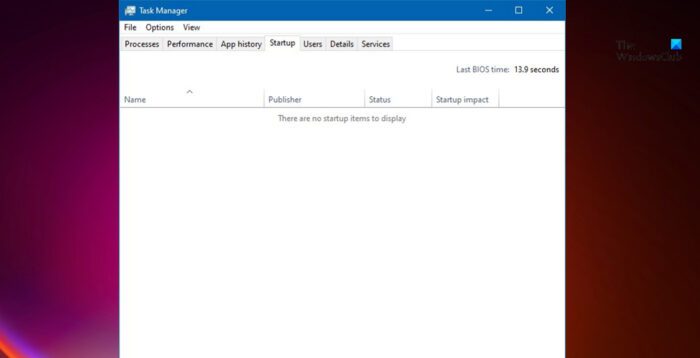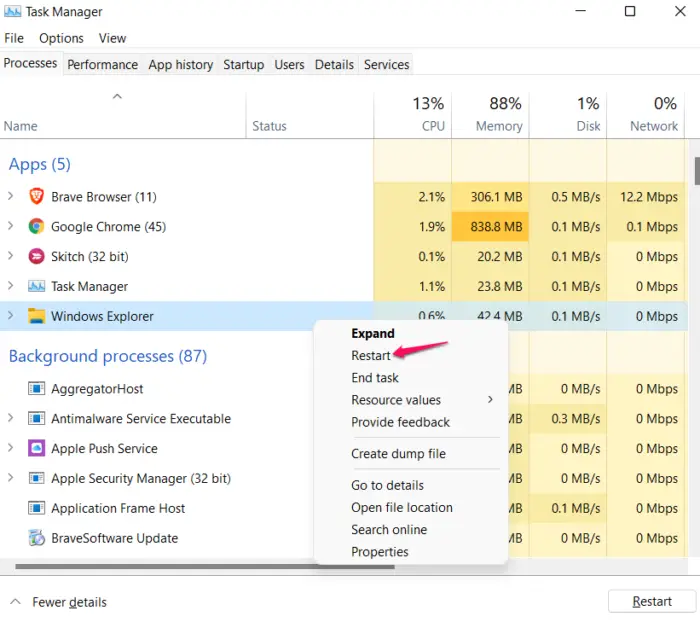If Startup apps are not appearing in the Task Manager & you see a message There are no startup items to display then this post is sure to help you. This issue can occur if the Startup folder or the Common Startup folder, which are Windows OS folders, have got inadvertently deleted, is their contents have become corrupted. When this happens, you may see a message in the Startup tab of the Task Manager:
There are no startup items to display.

There are no startup items to display in Task Manager
Task Manager is the place where you can find all the programs, processes, startup apps, and services running on your system. It is where you can keep an eye on every activity going on your Windows PC. Under its Startup tab, you can see all the Startup programs being displayed. But if the startup items are not appearing, even when you know that your Windows 11/10 has some programs that start automatically, here’s what you need to do to resolve the issue. Before you begin, you might want to use a Startup manager program to check if indeed you do have startups or not. If you do, but do not see them in the Task Manager, then read on.
- Restart the system
- Restart Windows Explorer
- Create a Startup folder
- Add application shortcut to the Startup folder
- Run SFC scan.
Now, let’s take a look at all these solutions in detail.
1] Restart the system
To begin with, restart your Windows PC. As it turns out, there can be a temporary glitch because of which the task manager is not displaying the startup apps. The best you can do to eliminate such glitches is to restart your Windows PC. So, restart the system and check if it solves the problem.
Related: Windows 11 Taskbar not working.
2] Restart Windows Explorer

Restarting Windows Explorer is another effective solution you can try if the Task Manager is not displaying any startup apps. The reason is again the same – temporary bug and corruption errors. So, restart Windows Explorer and check if the problem is solved. To restart, photo the Windows apps.
- Press the Ctrl + Shift + Esc hotkeys to open the Task Manager.
- In the process tab, locate Windows Explorer. It will be present under the Apps section.
- Right-click on Windows Explorer, and from the context menu, choose Restart.
Check if the problem is fixed or not. If not, try the next solution.
Read: Startup Apps not showing in Settings app of Windows
3] Create a Startup folder

The next thing you can do is create a new Startup folder. As it turns out, the problem will occur if there isn’t any Startup folder present in Explorer of your Windows PC. If this is the case, Windows will struggle to locate the startup apps on your system, which will automatically cause the mentioned problem. You will have to create a new Startup folder to solve the issue. Here are the steps you need to follow to get the work done.
The Current Users Startup folder in Windows 11/10 is located at:
C:\Users\<username>\AppData\Roaming\Microsoft\Windows\Start Menu\Programs\Startup
These programs start up for the currently logged-in user only. To directly access this folder, open Run, type shell:startup and hit Enter.
The All Users Windows 11/10 Startup folder is located at:
C:\ProgramData\Microsoft\Windows\Start Menu\Programs\StartUp
These programs start up for all users. To open this folder, bring up the Run box, type shell:common startup and hit Enter.
If you do not see the Startup folder in both these locations, do the following in each location:
- Right-click on the location and select New.
- From the context menu, choose Folder.
- Create a new folder, and name it Startup.
Now, restart your system, and open the Task Manager. Head towards the Startup tab and check if you can find the applications listed or not.
See: Force close a Program which Task Manager cannot terminate
4] Add application shortcut to the Startup folder
The next thing you can try is to add the shortcut of the application you want to run during boot to the Startup folder. Follow the below steps to do so.
- Press the Windows key to open the Start Menu.
- In the space provided, type the application name you want to run during Startup.
- Right-click on the application name, choose More, and from the context menu, select Open file location. If you can’t find the Open file location option, it indicates that the particular application can’t run during Startup.
- In the application location, locate its shortcut.
- Now, press the Windows + R shortcut key to open the Run dialogue box.
- Type shell:startup and hit the Enter key. It will open the Startup folder.
- Copy-paste the shortcut of the application you want to launch during Startup in the startup folder.
Now, restart your system and check if the problem is solved or not. If the problem continues, try the next solution.
Read: Startup tab missing from Task Manager in Windows
5] Run SFC scan
Another effective solution you can try is to run an SFC scan on your system. The SFC scan checks for broken Windows components on your system, as they can be the major reason behind the mentioned problem. You can run an SFC scan by following the below steps.
Open Command Prompt in administrator mode.
In the space provided, copy-paste the below-mentioned command and press enter.
sfc /scannow
Command Prompt will take a few minutes to execute the command. Once the process is complete, restart your system, launch Task Manager, and head towards the Startup tab. See if there are Startup applications present or not.
Read: How to set Delay time for Startup programs
How do I add apps to Task Manager on Startup?
To manually configure apps to run during Startup, open the Run dialogue box. Type shell:startup, and hit Enter. It will open the Startup folder. Now, paste the application’s shortcut you want to launch during Startup in the folder. That’s it.
Read: Disabled startups do not run after re-enabling them
How do I see what’s running on Startup?
It’s very easy to see all the running apps during Startup. Open the Task Manager, and navigate to the Startup tab. Here you’ll find all the applications that run during the Startup.
Read Next: Task Manager is not responding, opening or disabled by administrator.